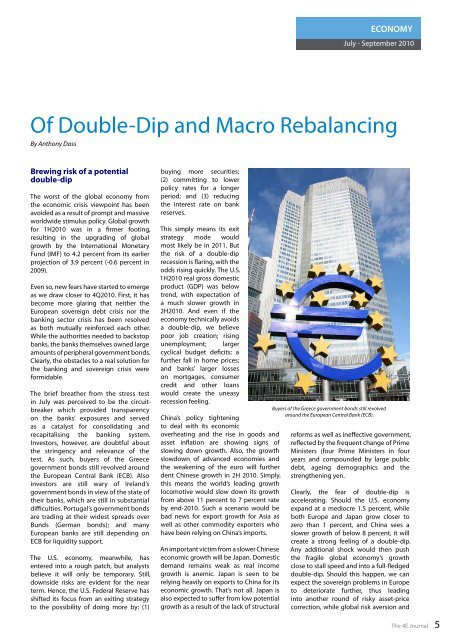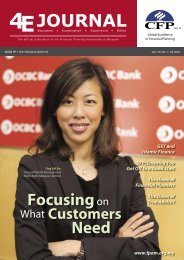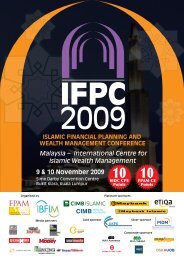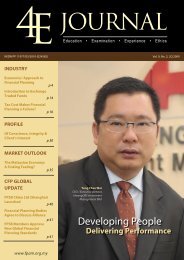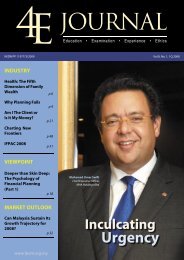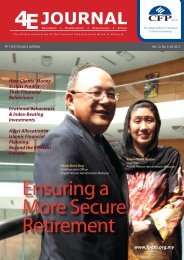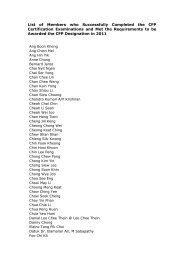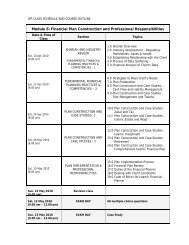Vol 10, No 3 - Financial Planning Association of Malaysia
Vol 10, No 3 - Financial Planning Association of Malaysia
Vol 10, No 3 - Financial Planning Association of Malaysia
You also want an ePaper? Increase the reach of your titles
YUMPU automatically turns print PDFs into web optimized ePapers that Google loves.
ECONOMY<br />
July - September 20<strong>10</strong><br />
Of Double-Dip and Macro Rebalancing<br />
By Anthony Dass<br />
Brewing risk <strong>of</strong> a potential<br />
double-dip<br />
The worst <strong>of</strong> the global economy from<br />
the economic crisis viewpoint has been<br />
avoided as a result <strong>of</strong> prompt and massive<br />
worldwide stimulus policy. Global growth<br />
for 1H20<strong>10</strong> was in a firmer footing,<br />
resulting in the upgrading <strong>of</strong> global<br />
growth by the International Monetary<br />
Fund (IMF) to 4.2 percent from its earlier<br />
projection <strong>of</strong> 3.9 percent (-0.6 percent in<br />
2009).<br />
Even so, new fears have started to emerge<br />
as we draw closer to 4Q20<strong>10</strong>. First, it has<br />
become more glaring that neither the<br />
European sovereign debt crisis nor the<br />
banking sector crisis has been resolved<br />
as both mutually reinforced each other.<br />
While the authorities needed to backstop<br />
banks, the banks themselves owned large<br />
amounts <strong>of</strong> peripheral government bonds.<br />
Clearly, the obstacles to a real solution for<br />
the banking and sovereign crisis were<br />
formidable.<br />
The brief breather from the stress test<br />
in July was perceived to be the circuitbreaker<br />
which provided transparency<br />
on the banks’ exposures and served<br />
as a catalyst for consolidating and<br />
recapitalising the banking system.<br />
Investors, however, are doubtful about<br />
the stringency and relevance <strong>of</strong> the<br />
test. As such, buyers <strong>of</strong> the Greece<br />
government bonds still revolved around<br />
the European Central Bank (ECB). Also<br />
investors are still wary <strong>of</strong> Ireland’s<br />
government bonds in view <strong>of</strong> the state <strong>of</strong><br />
their banks, which are still in substantial<br />
difficulties. Portugal’s government bonds<br />
are trading at their widest spreads over<br />
Bunds (German bonds); and many<br />
European banks are still depending on<br />
ECB for liquidity support.<br />
The U.S. economy, meanwhile, has<br />
entered into a rough patch, but analysts<br />
believe it will only be temporary. Still,<br />
downside risks are evident for the near<br />
term. Hence, the U.S. Federal Reserve has<br />
shifted its focus from an exiting strategy<br />
to the possibility <strong>of</strong> doing more by: (1)<br />
buying more securities;<br />
(2) committing to lower<br />
policy rates for a longer<br />
period; and (3) reducing<br />
the interest rate on bank<br />
reserves.<br />
This simply means its exit<br />
strategy mode would<br />
most likely be in 2011. But<br />
the risk <strong>of</strong> a double-dip<br />
recession is flaring, with the<br />
odds rising quickly. The U.S.<br />
1H20<strong>10</strong> real gross domestic<br />
product (GDP) was below<br />
trend, with expectation <strong>of</strong><br />
a much slower growth in<br />
2H20<strong>10</strong>. And even if the<br />
economy technically avoids<br />
a double-dip, we believe<br />
poor job creation; rising<br />
unemployment; larger<br />
cyclical budget deficits; a<br />
further fall in home prices;<br />
and banks’ larger losses<br />
on mortgages, consumer<br />
credit and other loans<br />
would create the uneasy<br />
recession feeling.<br />
China’s policy tightening<br />
to deal with its economic<br />
overheating and the rise in goods and<br />
asset inflation are showing signs <strong>of</strong><br />
slowing down growth. Also, the growth<br />
slowdown <strong>of</strong> advanced economies and<br />
the weakening <strong>of</strong> the euro will further<br />
dent Chinese growth in 2H 20<strong>10</strong>. Simply,<br />
this means the world’s leading growth<br />
locomotive would slow down its growth<br />
from above 11 percent to 7 percent rate<br />
by end-20<strong>10</strong>. Such a scenario would be<br />
bad news for export growth for Asia as<br />
well as other commodity exporters who<br />
have been relying on China’s imports.<br />
An important victim from a slower Chinese<br />
economic growth will be Japan. Domestic<br />
demand remains weak as real income<br />
growth is anemic. Japan is seen to be<br />
relying heavily on exports to China for its<br />
economic growth. That’s not all. Japan is<br />
also expected to suffer from low potential<br />
growth as a result <strong>of</strong> the lack <strong>of</strong> structural<br />
Buyers <strong>of</strong> the Greece government bonds still revolved<br />
around the European Central Bank (ECB).<br />
reforms as well as ineffective government,<br />
reflected by the frequent change <strong>of</strong> Prime<br />
Ministers (four Prime Ministers in four<br />
years and compounded by large public<br />
debt, ageing demographics and the<br />
strengthening yen.<br />
Clearly, the fear <strong>of</strong> double-dip is<br />
accelerating. Should the U.S. economy<br />
expand at a mediocre 1.5 percent, while<br />
both Europe and Japan grow closer to<br />
zero than 1 percent, and China sees a<br />
slower growth <strong>of</strong> below 8 percent, it will<br />
create a strong feeling <strong>of</strong> a double-dip.<br />
Any additional shock would then push<br />
the fragile global economy’s growth<br />
close to stall speed and into a full-fledged<br />
double-dip. Should this happen, we can<br />
expect the sovereign problems in Europe<br />
to deteriorate further, thus leading<br />
into another round <strong>of</strong> risky asset-price<br />
correction, while global risk aversion and<br />
The 4E Journal 5


